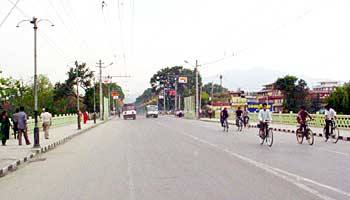 During this Nepal bandh the Beed noticed vehicles plying the streets with their license plates covered. Some more imaginative riders pasted on signs proclaiming their "Freedom to Ride". The drivers did this as insurance against trouble, immediate and future, from the organisers of the bandh. The authorities, decided not to intervene because they wanted vehicles on the streets, regardless of the negative incentives such violations of rules can provide to criminal elements.
During this Nepal bandh the Beed noticed vehicles plying the streets with their license plates covered. Some more imaginative riders pasted on signs proclaiming their "Freedom to Ride". The drivers did this as insurance against trouble, immediate and future, from the organisers of the bandh. The authorities, decided not to intervene because they wanted vehicles on the streets, regardless of the negative incentives such violations of rules can provide to criminal elements. In the quest for "normalcy" we've begun to flout simple rules, not caring about the consequences. It is a painful decision, but is it right for this moment? The death toll announced by government has begun to resemble cricket scores and, like with cricket scores, people's memories now only hold on to very large numbers. More Nepalis are dying everyday, no one knows for what and why this has to be.
Peace is getting dearer. More infrastructure is hit every day, more districts are cut off from the telecom network and more transport vehicles are damaged or brought to a halt. The cost of all this-to replace lost goods and vehicles and lost opportunities-is tremendous. For instance, Sauraha in Chitwan had just started to see some tourists, but with the telephone system now dead, only a daring few are now travelling. The insurgency and counter-insurgency measures have hit distribution channels and since it is difficult to move supplies, companies are producing less, as well as suffering other direct losses in the process.
Finally, after six years of cocktail party chatter that just castigated the government, the police, or both, and sometimes applaud the Maoists, Valley residents are beginning to get what the problem is all about. For one, real estate prices in the capital are rising as more and more people affected by the conflict are selling off their little all to buy peace in what is still perceived as a secure place to live. In the districts, the general public has begun following the footsteps of their lawmakers and other political leaders who left their villages a long time ago. The people facing the worst of the violence now are those caught in the crossfire who cannot afford to flee to safer areas. Political leaders must return to their constituencies and help those left behind resist the Maoist onslaught.
There's plenty of talk about the need for peace and dialogue, but nothing will happen as long as our political scroungers see every tragedy as an opportunity to cash in on. Our problems are beyond party politicking: which party should get how many of those who lay down arms, what faction should be in government when-and if-peace comes about. We've moved beyond that and as Prithvi Narayan Shah said, and Maoist ideologue Baburam Bhattarai repeated recently in a newspaper column, sabai lai chetana bhaya, let it be known to one and all. We all need to intervene creatively, whatever our social status and ideological position. The lawyers have already begun, others should join in.
There are also ways for donors to help. They need to unite and push the government to prepare a common agenda . No more seminars, though. We could do better with some action-oriented integrated development efforts, relief packages, service delivery mechanisms-anything that will produce visible results. A US military team was here, others might come. Just a word of caution: we can't let this become a matter of geo-politics, with Nepal's northern and southern neighbours misconstruing the presence of the US or other countries in a different way. If that happens, once again the definition and price of peace might be something we don't want to deal with.
Readers can post their views at [email protected]



